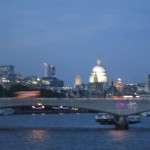To what extent is the Waste Land spatial, historical, and real? London strikes me as an “Unreal City” in a couple of (possibly) useful ways for coming at the poem. The City of London is actually only slightly bigger than one square mile and refers to an originally Roman settlement that is now only a tiny core at the heart of a massive metropolis. It still remains an administrative and peculiar place, with a Lord Mayor of London who is NOT the mayor of London. Eliot’s London — and despite being an American he sees it at his London — is well established as the leading hub of global finance, a role it continues today. The “City” also functions as a metonym (thanks Kevin for defining this) for the UK’s financial district, a usage clearly employed by Eliot. Today, only about 7,000 people live in the City, but close to half a million people work there, swelling its population by day, streaming home to the suburbs by night. Eliot captures this phenomenon in the poem, likening the daily pilgrimage to work and back as a living death by connecting it to Dante’s Inferno: “I had not thought death had undone so many.” The litany of actual London locations, most of them in or near the City, places the poem, in one sense, in a real place. But Eliot is clearly trading on the non-spatial, unreal, surreal notion of the City as well, a place “populated” by soul-less bankers in bowler hats, some of them “Bradford millionaires” — outsiders and upstarts.
London may also be unreal in the sense that it is destined to be only the latest in a series of fallen towers referenced, directly or obliquely, in the poem: Carthage, Babylon, Jerusalem, Athens, Alexandria, Vienna… all have had their day. Fleeting, ephemeral, “stony rubbish,” a “heap of broken images” — a fate that figuratively, even literally, await all great civilizations. But where is Rome it might be asked? I would suggest that London is Rome, or rather its “surviving” modern outpost, physically alive (“a human engine”) but spiritually dead…. “but there is no water.” “London bridge is falling down, falling down, falling down,” taking with it a sea of humanity. The waste land then is a place, in time and space, but also, and more importantly, a spiritual condition universalized by articulating it in the context of civilizations past, and the great City of London present, itself a collection of civilizational layers and fragments.
